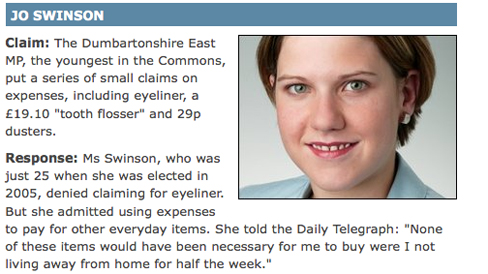So who wants the films rights to MPs’ expenses? It’s on a far less grave subject, but maybe it will be like the 9/11 films; the aftermath still permeating society, when the scripts are sold and production started. The next general election may not even have happened. Gordon Brown could still be Prime Minister. Just.
Or perhaps (Sir? ‘Lord’ is less likely given the target) Will Lewis’ memoirs will have been on sale for a while first, before the 21st century’s equivalent of ‘All the President’s Men’ is released, to allow the dust to settle.
Whichever way, this archetypal British plot is the stuff of a (Working Title, maybe) director’s dream; even if the journalism itself is markedly not Watergate, as most hardened investigative hacks and other journalists at rival titles are quick to point out. The gate of significance in this story is the one at the end of the second home’s garden path. No Deep Throat, just Deep Pockets.
A small group of privileged Telegraph journalists has been embedded from early till late in what’s apparently known as ‘the bunker’ – a room separate from the main newsroom, away from the ‘hub and spokes’, away from the Twitterfall graphic projected on the wall – sifting through the details of thousands upon thousands of supermarket, DIY store and restaurant receipts and other documents.
It’s got all the ingredients for the heroic hack flick: the furtive deal with the middle man and the original whistleblower, for an undisclosed sum (no doubt to be revealed in Lewis’ or possibly Ben Brogan’s memoirs), at one point rumoured to be £300,000.
While this whole expose – the ‘Expenses Files’ as the Telegraph first called it – is most definitely built on a film-like fantasy, it is grounded in career-breaking political change, and last night’s audience at the Frontline Club for a debate on the paper’s handling of the stories, got a little insight into the process; a rare chance, as the paper has mainly been very quiet on just how it’s done it.
The ‘consequences were massively in the public interest,’ argued the Telegraph’s assistant editor, Andrew Pierce, who popped up on BBC Breakfast news this morning as well. “It was brilliant, brilliant old fashioned journalism (…) at its finest.
“It’s so exciting – you were aware you had stuff, it was going to change things, and boy it has…
“Of course it’s been terrific for the circulation – we’re a newspaper and we’re there to make sales.”
According to Pierce, 240 broadsheet pages covering the story have been published so far.
“So far we’ve published one correction: we got a house mixed up. I’d say in terms of journalism that ain’t a bad ratio.”
That was disputed by one member of last night’s panel, Stephen Tall, editor-at-large for the Liberal Democrat Voice website; he’s unlikely to get a cameo as it would rather spoil the plot.
Tall’s complaint was that three stories on Liberal Democrats have been misrepresented in separate stories and received insufficient apology; something Journalism.co.uk will follow up on elsewhere, once we’ve moved on from this romanticised big screen analogy.
Back to the glory: Pierce described how journalists from around the world had been to peek at the unfolding scene of action – they’ve had camera crews from Turkey, Thailand and China, in for visits, he said.
There’s a ‘sense of astonishment’, he added. ‘They thought quaint old Britain’, the mother of all democracies, ‘was squeaky clean.’
The story, Pierce claimed, ‘has reverberated all the way around the world’. “We actually are going to get this sorted out. Were MPs really able to set their own pay levels? Their own expenses levels? And it was all tax free.”
‘Old-fashioned journalism lives on’ has become the war cry of the Telegraph and its champions, in defence of the manner in which it acquired and dealt with the data.
For raw blogging it is not. Any CAR is kept secret in-house. Sharing the process? Pah! This is as far away from a Jarvian vision of journalism built-in-beta as you can imagine. While other news operations – the Telegraph’s own included – increasingly open up the inner workings (former Telegraph editor Martin Newland’s team at The National in Abu Dhabi tweeted live from a significant meeting yesterday morning) not a social media peep comes from the bunker till the paper arrives back from the printers.
There might be little teasers on the site with which to taunt their rivals, but for the full meaty, pictorial evidence it’s paper first, online second. Rivals, Pierce said, have to ‘wait for the second edition before they rip it off’.
Nobody has it confirmed how much they officially coughed up for the story – ‘we don’t use the words bought or paid,’ said Pierce. Though last night’s host, Guardian blogger and journalism professor Roy Greenslade, twice slipped in a speculative reference to £75,000, Pierce refused to be drawn.
“Fleet Street has existed for years on leaks,” said Pierce, as justification. “We will stick to our guns (…) and not discuss whether money changed hands.”
Enter the hard done by heroine of the piece: Heather Brooke. Much lauded and widely respected freedom of information campaigner, she and other journalists – one from the Sunday Telegraph (Ben Leapman); one from the Times (Jonathan Ungoed-Thomas) – did the mind-numbingly boring hours of Freedom of Information requests and tedious legal battles over several years, only to lose the scoop to a chequebook.
Will she get a part in the government-destroyed-by-dodgy-expenses film? If Independent editor, Roger Alton, was casting she certainly would. In fact, she deserves a damehood, he declared last night.
A member of the audience asked whether Alton would have paid for the information himself if he had had the chance. Unlike his last foray to the Frontline, the Independent editor knew he was being filmed this time. A pause for ethical reflection before he answered, then:
“We’ve barely got enough money to cover a football match for Queens Park Rangers. Take a wild guess! Any journalist would cut off their left arm and pickle it in balsamic vinegar!”
That’s a yes then, we presume.
Apparently, Sun editor Rebekah Wade turned it down after being told there wasn’t much chance of a Jacqui Smith style porn revelation or a cabinet resignation. “She asked ‘would this bring down a cabinet minster?’ And she was told it wouldn’t,” claimed Pierce. How wrong the data tout(s) were about their own stuff.
More embarrassing for the Telegraph, though Pierce said he knew nothing of it, was Brooke’s revelation that the Sunday Telegraph had refused to back their man financially, a case which Brooke, Leapman and Ungoed-Thomas finally won in the High Court – the judge ordered disclosure of all receipts and claims of the 14 MPs in original requests, along with the addresses of their second homes.
Update: Ben Leapman responds on Jon Slattery’s blog here: “I never asked my employer to pay for a lawyer because I took the view that journalists ought, in principle, be able to go to FoI tribunals themselves without the barrier of having to pay. I also took the view, probably rather arrogantly, that in this emerging field of law I was perfectly capable of putting the arguments directly without a lawyer.” Leapman was represented by solicitor advocate Simon McKay ‘very ably for no fee’ in the High Court, he writes.
Publication of all MPs’ expense claims are now forthcoming, after redaction (‘a posh word for tippexing out,’ said Pierce.) In July 2008, ‘parliament went against the court by exempting some information – MPs’ addresses – from disclosure,’ the Guardian reported.
Now, for a name for our blockbuster. ‘The Month Before Redaction‘? ‘Bunker on Buckingham Palace Road‘? ‘646 Expense Forms and a Re-shuffle‘? I can predict a more likely tag line at least, the now all too familiar: ‘They said they acted within the rules’.
The ending to this expenses epic is not yet known, but there won’t be many happy endings in Parliament. Pierce promises more stories, with no firm end date, but unsurprisingly, didn’t give any hint of what lies ahead. Could an even bigger scoop be on its way? Who’s left?







